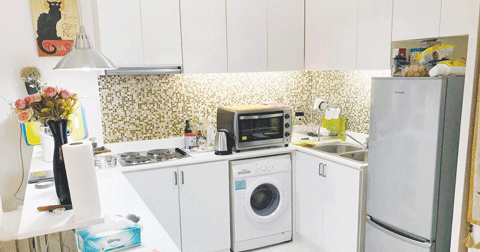CUSTOMISED: Gopinath’s custom-made kitchen which is ideal for single men
By C. Y Gopinath
Washing dishes particularly for men can be a very educative experience. A well known columnist based in Thailand expounds on lessons he learnt from washing dishes every day ever since he divorced!
I have been washing my own dishes since 2017, after deciding that a single man living alone should not need a housemaid. My kitchen is an area of about 4.5 square metres with a stainless steel double sink. To its left is a small rack for washed utensils with a plastic tray to collect the drip. My kitchen is undeniably charming — white-tiled, warmly lit with hanging lights, and full of happy surprises.
However, it is part of an open-plan living room, so its appearance affects my living room’s aesthetics. A kitchen sink full of greasy dishes is a scandal in my living room.
My first lesson in this menial space was: Don’t leave dishes unwashed too long.
Washing up tout de suite is now a deeply ingrained habit; my gleaming sink fills me with pride. More important, this attitude has leached over into my daily life. If something needs fixing, I find myself doing it right away rather than “leaving it in the sink”.
Over the years, I began noticing things about dishwashing, things a housemaid or a mother would miss because they always wash up in a jiffy. I began asking borderline philosophical questions, such as how could you tell if a black non-stick dosa tava was truly clean?
I evolved into a mindful dishwasher, wallowing in the Zen of cleaning up, having sudsy eureka moments, saucepan-induced satori. Every dishwashing lesson, I now realise, hides a profound life lesson. And the time has come to share some of them.
- The thing that cleans soon becomes very dirty. I use lime-scented dishwashing detergent in a repurposed marble mortar. But the sunny yellow liquid will be cloudy grey and gritty well before it’s even half empty. The sponge, clean at first, dirties the soap solution with each dip, while getting soiled itself. Soon my dishes are clean but the cleaning tools are filthy. Tip: don’t try to use every last drop of soap water or wait till the sponge is in shreds.
Life lesson: The spotless can become the sullied unless you are constantly paying attention. The shiniest parts of you will become grimy if you don’t regularly attend to them. Principles decay, values decline, and you stop being the best you can be. What makes some priests, charged with keeping souls clean, turn into child-abusing paedophiles? - Wash the little things first. A sink full of dirty dishes can be a depressing sight, especially late at night after a party when all the guests have left. These days, I start with the spoons and forks. In minutes, they have disappeared, leaving only a few large utensils. Of them, I deal next with the unwieldy plates, so large that they don’t even sit well in the sink. With those gone, I feel suddenly lighter, with just three or four pans to go.
Life lesson: When problems pile up and you see stress everywhere you look, deal with the small, easy ones first. A few big dogs are easier to manage if you’ve gotten the yapping poodles out of the way. - Leave difficult dishes to soak. In my second year of dishwashing I learned that a rinse with water should come before a scrub with soap. Water sweeps away the solids, soap takes care of the rest. But as for those nasty, charred utensils, leave them full of water and forget about them. They will all surrender softly when you come back an hour later.
Life lesson: Walk away from the things you cannot solve and return later. Time dissolves the most obstinate problems. - There’s grime on the fridge and the wall. One day I noticed that the fridge to the right of the sink and the tiled wall behind it were splotchy with caked grime. Dishwashing creates splashes and the spray must land somewhere. Except that with tunnel vision I never looked anywhere but the sink. It took me an hour to scrub them back to life.
Life lesson: Time and again, dishwashing has taught me that getting something clean makes something else dirty, whether it’s the sponge, the soap water, the wall or the fridge. Whatever you do, look for the unintended consequences.
What about that deep question about how to tell when your black non-stick tava is truly clean? - Check with your fingers first. The saucepan looked clean but my fingers detected small gritty, grainy particles. Your fingers can detect what your eyes can’t see. Human fingers can feel objects as small as 13 nanometers. Put differently, if your finger was the size of the planet, it would feel the gap between your house and your car. Now I always touch-test my washed dishes before I inspect them.
This may be the biggest life lesson: don’t believe everything you see because sometimes your eyes see what they want to see. Consult your instinct. God is in the details.
Courtesy:MidDay
